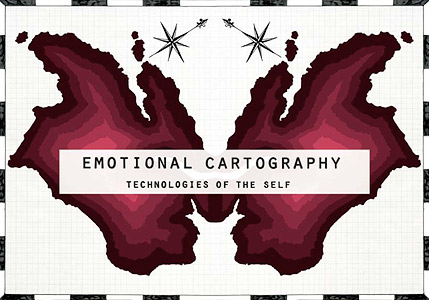Félix Guattari, Suely Rolnik: Molecular Revolution in Brazil (1986–) [BR-PT, ES, EN]
Filed under book | Tags: · abstract machine, body, brazil, cartography, culture, desire, deterritorialization, emotion, energy, history, love, philosophy, politics, psychoanalysis, schizoanalysis, semiotics, sex, subjectivation, subjectivity, unconscious

“Following Brazil’s first democratic election after two decades of military dictatorship, French philosopher Félix Guattari traveled through Brazil in 1982 with Brazilian psychoanalyst Suely Rolnik and discovered an exciting, new political vitality. In the infancy of its new republic, Brazil was moving against traditional hierarchies of control and totalitarian regimes and founding a revolution of ideas and politics. Molecular Revolution in Brazil documents the conversations, discussions, and debates that arose during the trip, including a dialogue between Guattari and Brazil’s future President Luis Ignacia Lula da Silva, then a young gubernatorial candidate. Through these exchanges, Guattari cuts through to the shadowy practices of globalization gone awry and boldly charts a revolution in practice.
Assembled and edited by Rolnik, Molecular Revolution in Brazil is organized thematically; aphoristic at times, it presents a lesser-known, more overtly political aspect of Guattari’s work. Originally published in Brazil in 1986 as Micropolitica: Cartografias do desejo, the book became a crucial reference for political movements in Brazil in the 1980s and 1990s. It now provides English-speaking readers with an invaluable picture of the radical thought and optimism that lies at the root of Lula’s Brazil.”
Originally published as Micropolítica: Cartografias do desejo, Vozes, Petrópolis, 1986.
English edition
Translated by Karel Clapshow and Brian Holmes
Publisher Semiotext(e), Los Angeles 2008
Foreign Agents series
ISBN 1584350512, 9781584350514
495 pages
Review: Aliocha wald Lasowski (Chimères, 2007, FR).
Publisher (EN)
Publisher (ES, Madrid)
Publisher (ES, Buenos Aires)
Micropolítica. Cartografias do desejo (BR-Portuguese, 4th ed., 1984/1996, added on 2017-2-22)
Micropolítica. Cartografías del deseo (Spanish, trans. Florencia Gómez, Madrid ed., 2006, added on 2013-9-26)
Molecular Revolution in Brazil (English, trans. Karel Clapshow and Brian Holmes, 2008, updated on 2017-6-26)
Micropolítica. Cartografías del deseo (Spanish, trans. Florencia Gómez, Buenos Aires ed., 2nd ed., 2006/2013, added on 2020-11-14)
Christian Nold (ed.): Emotional Cartography: Technologies of the Self (2009)
Filed under book | Tags: · biometrics, cartography, community art, data visualisation, hacking, mapping

Emotional Cartography is a collection of essays from artists, designers, psychogeographers, cultural researchers, futurologists and neuroscientists, brought together by Christian Nold, to explore the political, social and cultural implications of visualising intimate biometric data and emotional experiences using technology.
Edited by Christian Nold, 2009
Essays by Raqs Media Collective, Marcel van de Drift, Dr Stephen Boyd Davis, Rob van Kranenburg, Sophie Hope and Dr Tom Stafford
A5 Offset Litho – 96 pages – Full Colour
ISBN 978-0-9557623-1-4
Published under a Creative Commons, Attribution, NonCommercial, ShareAlike Licence
More info (author)
PDF (Full Quality PDF, 44 MB)
PDF (Screen Quality PDF, 2 MB)
MIT Comparative Media Studies student theses (2001-2008)
Filed under thesis | Tags: · cartography, curating, data visualisation, internet art, media culture, net art, politics
AMANDA FINKELBERG
Space, Place, and Database: Digital Cartography in the Network Age (2007)
This paper addresses the changes in cartography since digitization and widespread popular dissemination. Cybercartography, an emergent system of maps, mapmaking tools, and mapmakers, forces a rethinking of spatial representations. The implicit distinction in digital media enables a new type of map user or neo-geographer that creates layers of expressions based on subjective experience. This paper argues that the neogeographer signifies a new cartographic behavior that affords a complex subjectivity. This behavior is further exhibited in the practice of navigable maps and virtual globes which lead the way to a paradigmatic change in the way we represent and interact with space. It is divided into three parts: Part I addresses the role of digitization in maps and lays out framework and vocabulary. Part II examines layers of spatial representations in historical context. Part III opens room for future study in the quickly developing inhabitable cartographic spaces of virtual globes and virtual worlds.
PDF
KAREN VERSCHOOREN
.art: situating internet art in the modern museum (2007)
This thesis provides a critical analysis of the relation between Internet art and the traditional institution for contemporary art in the North American and West-European regions. Thirteen years after its inception as an art form, the Internet art world finds itself in a developmental stage and its relation to the traditional institution for contemporary art is accordingly. Through an elaborate discussion of the key players, institutions and discourses on aesthetics, economics and exhibition methodologies, this sociological analysis of the past and current situation hopes to offer a solid ground for extrapolation and predictions for Internet art’s future as an art world in its relation to the traditional art institutions.
PDF
STEPHANIE DAVENPORT
Experiments in Corporate Collaboration: The Case of the Ars Electronica FutureLab (2003)
PDF
SOPHIE ORMEROD
The Medium Still Isn’t the Message: Revisiting the Link Between Communication Technologies and Political Liberalization (2002)
PDF

